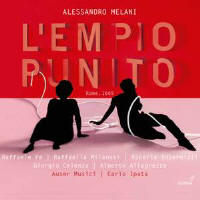Texte paru dans: / Appeared in:
|
|||||||
|
Outil de traduction (Très approximatif) |
|||||||
|
Reviewer:
David Vickers The extravagant production of L’empio punito (1669) in the Palazzo Colonna was attended by 26 cardinals, numerous princes and ambassadors, and the exiled Queen Christina of Sweden. Based on Tirso de Molina’s El burlador de Sevilla y convidado de piedra (c1616), it is the first known opera on the legend of Don Juan’s impious ways punished by a vengeful stone guest – but all its characters are given completely different names and the action is set in the ancient Macedonian city of Pella (rather than Seville). The serial philanderer Acrimante is condemned to death when found guilty of climbing up to the balcony of the King Atrace’s sister Ipomene (although, this time, it was his servant Bibi, disguised in his master’s clothes, creeping up to visit the princess’s maid Delfa). The scoundrel escapes death when the jilted Atamira (one of the many women he has conquered and abandoned) swaps the fatal dose of poison with sleeping potion. In feverish dreams the unrepentant Acrimante flirts with Proserpina (and deflowers her servant). After recovering consciousness, the incorrigible libertine pays a nocturnal visit to Ipomene, whose cries alert her tutor Tidemo, who is killed by Acrimante. Later that night, the murderer sees a statue of his victim in the palace garden and mockingly instructs Bibi to invite it to dinner. Suddenly, a banquet appears with six stone guests; Tidemo’s statue sends Acrimante to hell, where the damned villain is forced to confront his sins. Up above, a sextet of happily united couples – Atrace and Atamira, Cloridoro and Ipomene, and Bibi and Delfa – moralise that heaven always punishes those who offend it. Melani’s opera featured 17 singing characters, 61 non-singing supernumerary actors, six statues, six monsters, 16 scene changes and much more – a veritable epic on the scale of Cecil B de Mille, albeit without any leading ladies (the original cast was all male). Luca Della Libera’s new scholarly edition is used by Auser Musici for a live warts-and-all recording made during a staged production at Pisa’s Teatro Verdi in October 2019. It is a pity there is no English translation of the complex libretto. Photographs suggest that Jacopo Spirei’s staging was eyecatching and engaging. The onstage singing lacks finesse that would be enabled by studio conditions, but the cast of 11 deliver cogent characterisations. Raffaele Pe is by turns callous, silver-tongued and hedonistic as Acrimante. Roberta Invernizzi’s brighttoned Ipomene is an effective contrast to the darker-hued plaints of Raffaella Milanesi’s Atamira. Ipomene’s maidservant Delfa is sung with comic extroversion by tenor-in-drag Alberto Allegrezza, whose saucy exchanges with Giorgio Celenza’s lusty Bibi provide a lowbrow commedia dell’arte counterweight to the (relatively) serious aristocratic characters. Nine strings, a pair of recorders and quintet of archlute, theorbo, harp and two harpsichords are conducted sagaciously by Carlo Ipata – despite perpetually shifting rotations of the basso continuo squad during recitatives that can become convoluted. The zesty performance reveals a quick-moving score packed with short musical episodes that falls somewhere between Cavalli’s Venetian comedies, Stradella and Alessandro Scarlatti. There are fewer memorable musical set pieces than one might expect (Melani’s contrapuntal sacred music proves he was an excellent composer), yet the vibrant performance illuminates under-explored operatic culture in late 17th-century Rome. Only 10 days earlier, a drastically abridged production by an entirely different company was performed at Rome’s Teatro di Villa Torlonia – staking its claim to being the first modern revival (by a matter of days). Cesare Scarton’s conceptual production is nearly an hour shorter, restructures three acts into two parts, and does not handle core characterisations and key events in the plot faithfully (we see no stone statue, let alone six, and can barely hear what he says). The downward transposition of Acrimante from alto (a papal chapel castrato) to baritone wrecks the internal harmonic balance of his music and radically alters characterisation; Mauro Borgioni’s seething menace is an aggressive prototype of Mozart’s antihero, and as the curtain falls he has an orgy with every female character in the cast (not bewailing his damnation). Baroque-infused shading is inconsistent from the capable cast, with the honourable exception of Sabrina Cortese’s nuanced portrayal of Atamira. Alessandro Quarta directs from the harpsichord to muscular effect, but musical merits across the board are undermined by the poor balance of the shoddy engineering on this Dynamic release. |
|||||||





